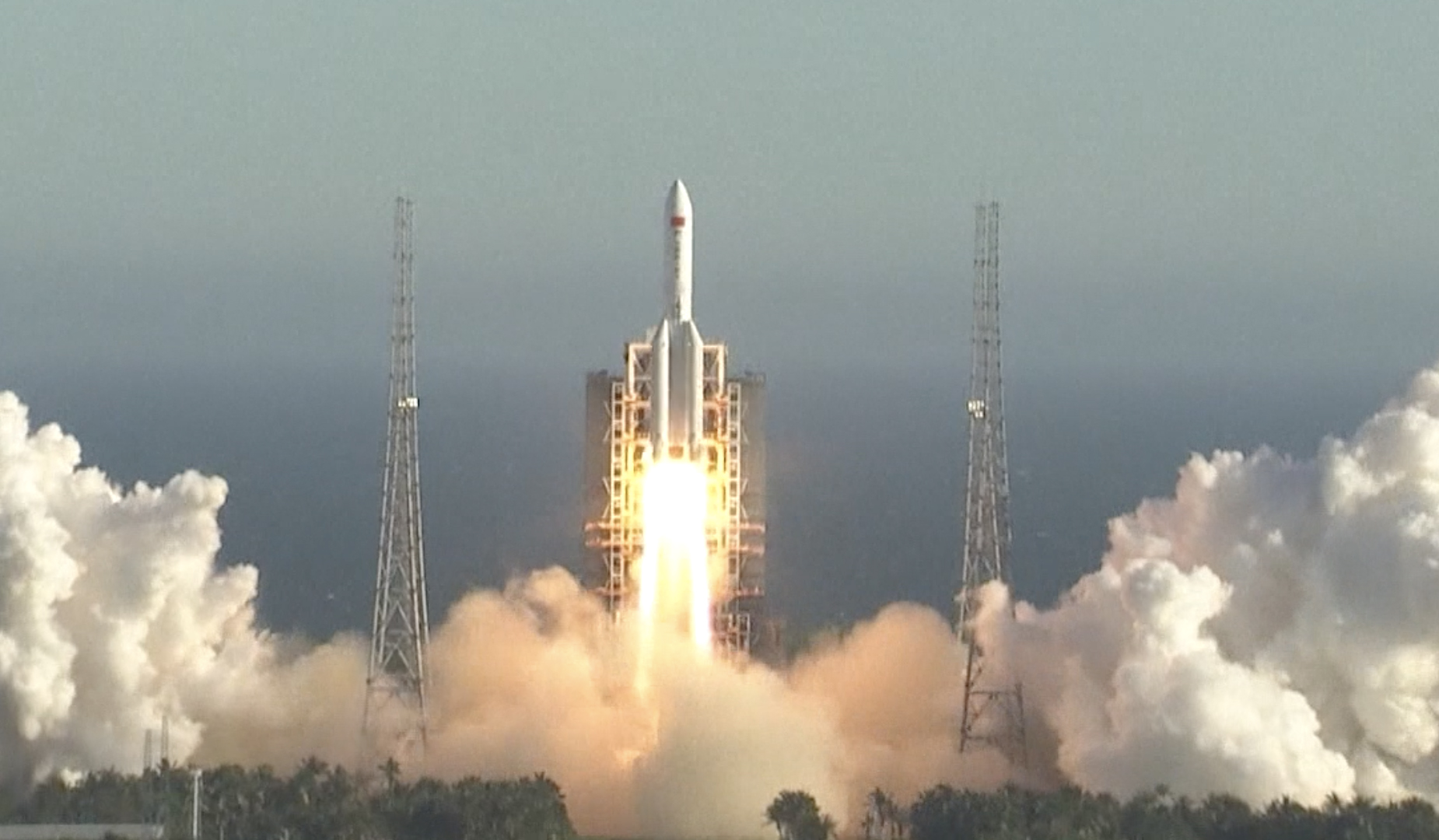Massive piece of Chinese space junk slams uncontrolled into Earth's atmosphere

A 19.6-ton (17,800 kilograms) Chinese rocket slammed into our planet today (May 11).
The bulky Long March 5B became the heaviest orbiting thing to fall uncontrolled to Earth in nearly three decades, according to Jonathan McDowell, a Harvard astrophysicist and orbital object tracker. The last time a heavier object had an uncontrolled entry was 1991, when the 43-ton (39,000 kg) Salyut-7 Soviet space station reentered the atmosphere over Argentina, McDowell wrote on Twitter. (Another contender he mentioned: the 2003 shuttle Columbia disaster, though that reentry did not become uncontrolled until the space shuttle was already in the atmosphere over Texas.)
In July 2019, the Chinese space station Tiangong-2 fell in a controlled descent through Earth’s atmosphere. But that 9.5-ton (8,600 kg) crash was less than half the size of today's descent, and it was guided remotely using the last of its fuel to land in a specific, remote bit of ocean. In 2018, that space station's predecessor, the 9.3-ton (8,500 kg) Tiangong-1, fell uncontrolled (but harmlessly) into the Pacific ocean.
The 18th Space Control Squadron, an Air Force space-tracking group, reported that Long March 5B reentered the atmosphere at 11:33 a.m. EST. At that time, it was just off the west coast of Africa, approaching Nouakchott, Mauritania. In the rocket's last half-hour in orbit, it passed over Hollywood, Colorado Springs and New York City's Central Park, according to McDowell.
Related: In Photos: A Look at China's space station that's crashing to Earth
"I've never seen a major reentry pass directly over so many major conurbations [metropolitan areas]!" McDowell tweeted.
The rocket's uncontrolled reentry path was largely determined by the last few days of space weather, McDowell said. Particles streaming from the sun can create drag and perturb the path of such a fast-moving piece of debris in ways that make its passage difficult to predict.
Breaking space news, the latest updates on rocket launches, skywatching events and more!
- The 12 strangest objects in the universe
- The Weirdest Things That Fell From The Sky
- The 15 weirdest galaxies in our universe
Originally published on Live Science.
OFFER: Save 45% on 'How It Works' 'All About Space' and 'All About History'!
For a limited time, you can take out a digital subscription to any of our best-selling science magazines for just $2.38 per month, or 45% off the standard price for the first three months.
A 19.6-ton (17,800 kilograms) Chinese rocket slammed into our planet today (May 11).
The bulky Long March 5B became the heaviest orbiting thing to fall uncontrolled to Earth in nearly three decades, according to Jonathan McDowell, a Harvard astrophysicist and orbital object tracker. The last time a heavier object had an uncontrolled entry was 1991, when the 43-ton (39,000 kg) Salyut-7 Soviet space station reentered the atmosphere over Argentina, McDowell wrote on Twitter. (Another contender he mentioned: the 2003 shuttle Columbia disaster, though that reentry did not become uncontrolled until the space shuttle was already in the atmosphere over Texas.)
In July 2019, the Chinese space station Tiangong-2 fell in a controlled descent through Earth’s atmosphere. But that 9.5-ton (8,600 kg) crash was less than half the size of today's descent, and it was guided remotely using the last of its fuel to land in a specific, remote bit of ocean. In 2018, that space station's predecessor, the 9.3-ton (8,500 kg) Tiangong-1, fell uncontrolled (but harmlessly) into the Pacific ocean.
The 18th Space Control Squadron, an Air Force space-tracking group, reported that Long March 5B reentered the atmosphere at 11:33 a.m. EST. At that time, it was just off the west coast of Africa, approaching Nouakchott, Mauritania. In the rocket's last half-hour in orbit, it passed over Hollywood, Colorado Springs and New York City's Central Park, according to McDowell.
Related: In Photos: A Look at China's space station that's crashing to Earth
"I've never seen a major reentry pass directly over so many major conurbations [metropolitan areas]!" McDowell tweeted.
The rocket's uncontrolled reentry path was largely determined by the last few days of space weather, McDowell said. Particles streaming from the sun can create drag and perturb the path of such a fast-moving piece of debris in ways that make its passage difficult to predict.
- The 12 strangest objects in the universe
- The Weirdest Things That Fell From The Sky
- The 15 weirdest galaxies in our universe
Originally published on Live Science.
OFFER: Save 45% on 'How It Works' 'All About Space' and 'All About History'!
For a limited time, you can take out a digital subscription to any of our best-selling science magazines for just $2.38 per month, or 45% off the standard price for the first three months.
A 19.6-ton (17,800 kilograms) Chinese rocket slammed into our planet today (May 11).
The bulky Long March 5B became the heaviest orbiting thing to fall uncontrolled to Earth in nearly three decades, according to Jonathan McDowell, a Harvard astrophysicist and orbital object tracker. The last time a heavier object had an uncontrolled entry was 1991, when the 43-ton (39,000 kg) Salyut-7 Soviet space station reentered the atmosphere over Argentina, McDowell wrote on Twitter. (Another contender he mentioned: the 2003 shuttle Columbia disaster, though that reentry did not become uncontrolled until the space shuttle was already in the atmosphere over Texas.)
In July 2019, the Chinese space station Tiangong-2 fell in a controlled descent through Earth’s atmosphere. But that 9.5-ton (8,600 kg) crash was less than half the size of today's descent, and it was guided remotely using the last of its fuel to land in a specific, remote bit of ocean. In 2018, that space station's predecessor, the 9.3-ton (8,500 kg) Tiangong-1, fell uncontrolled (but harmlessly) into the Pacific ocean.
The 18th Space Control Squadron, an Air Force space-tracking group, reported that Long March 5B reentered the atmosphere at 11:33 a.m. EST. At that time, it was just off the west coast of Africa, approaching Nouakchott, Mauritania. In the rocket's last half-hour in orbit, it passed over Hollywood, Colorado Springs and New York City's Central Park, according to McDowell.
Related: In Photos: A Look at China's space station that's crashing to Earth
"I've never seen a major reentry pass directly over so many major conurbations [metropolitan areas]!" McDowell tweeted.
The rocket's uncontrolled reentry path was largely determined by the last few days of space weather, McDowell said. Particles streaming from the sun can create drag and perturb the path of such a fast-moving piece of debris in ways that make its passage difficult to predict.
- The 12 strangest objects in the universe
- The Weirdest Things That Fell From The Sky
- The 15 weirdest galaxies in our universe
Originally published on Live Science.
OFFER: Save 45% on 'How It Works' 'All About Space' and 'All About History'!
For a limited time, you can take out a digital subscription to any of our best-selling science magazines for just $2.38 per month, or 45% off the standard price for the first three months.

Rafi wrote for Live Science from 2017 until 2021, when he became a technical writer for IBM Quantum. He has a bachelor's degree in journalism from Northwestern University’s Medill School of journalism. You can find his past science reporting at Inverse, Business Insider and Popular Science, and his past photojournalism on the Flash90 wire service and in the pages of The Courier Post of southern New Jersey.


